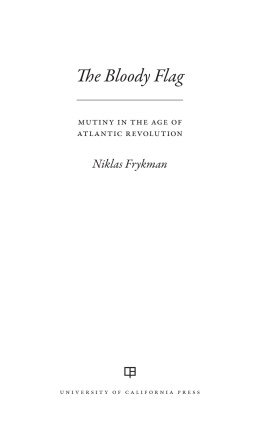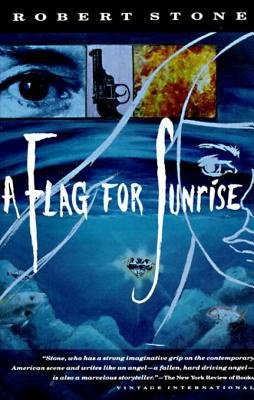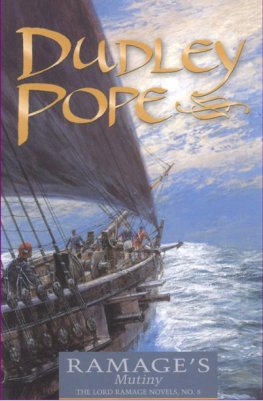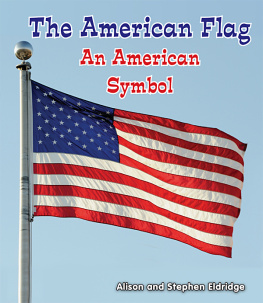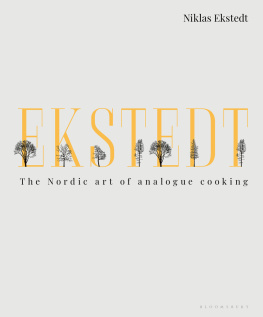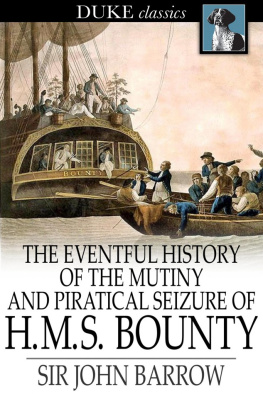Niklas Frykman - The Bloody Flag: Mutiny in the Age of Atlantic Revolution
Here you can read online Niklas Frykman - The Bloody Flag: Mutiny in the Age of Atlantic Revolution full text of the book (entire story) in english for free. Download pdf and epub, get meaning, cover and reviews about this ebook. year: 2020, publisher: University of California Press, genre: Romance novel. Description of the work, (preface) as well as reviews are available. Best literature library LitArk.com created for fans of good reading and offers a wide selection of genres:
Romance novel
Science fiction
Adventure
Detective
Science
History
Home and family
Prose
Art
Politics
Computer
Non-fiction
Religion
Business
Children
Humor
Choose a favorite category and find really read worthwhile books. Enjoy immersion in the world of imagination, feel the emotions of the characters or learn something new for yourself, make an fascinating discovery.
- Book:The Bloody Flag: Mutiny in the Age of Atlantic Revolution
- Author:
- Publisher:University of California Press
- Genre:
- Year:2020
- Rating:5 / 5
- Favourites:Add to favourites
- Your mark:
- 100
- 1
- 2
- 3
- 4
- 5
The Bloody Flag: Mutiny in the Age of Atlantic Revolution: summary, description and annotation
We offer to read an annotation, description, summary or preface (depends on what the author of the book "The Bloody Flag: Mutiny in the Age of Atlantic Revolution" wrote himself). If you haven't found the necessary information about the book — write in the comments, we will try to find it.
The Bloody Flag: Mutiny in the Age of Atlantic Revolution — read online for free the complete book (whole text) full work
Below is the text of the book, divided by pages. System saving the place of the last page read, allows you to conveniently read the book "The Bloody Flag: Mutiny in the Age of Atlantic Revolution" online for free, without having to search again every time where you left off. Put a bookmark, and you can go to the page where you finished reading at any time.
Font size:
Interval:
Bookmark:

The publisher and the University of California Press Foundation gratefully acknowledge the generous support of the Peter Booth Wiley Endowment Fund in History.
Edited by Edmund Burke III, Kenneth Pomeranz, and Patricia Seed
Niklas Frykman

UNIVERSITY OF CALIFORNIA PRESS
University of California Press
Oakland, California
2020 by Niklas Frykman
Library of Congress Cataloging-in-Publication Data
Names: Frykman, Niklas, author.
Title: The bloody flag : mutiny in the age of Atlantic revolution / Niklas Frykman.
Other titles: 0 California world history library ;
Description: Oakland, California : University of California Press, [2020] | Series: 1 California world history lib | Includes bibliographical references and in
Identifiers: LCCN 2019052052 (print) | LCCN 201905 (ebook) | ISBN 9780520355477 (cloth) | ISBN 9780520975927 (epub)
Subjects:
Classification: LCC HN 49. R 33 . F 79 2020 (print) | LCC HN 49. R 33 (ebook) | DDC 303.48/4dc23
LC record available at https://lccn.loc.gov/2019052052
LC ebook record available at https://lccn.loc.gov/2019052053
Manufactured in the United States of America
29 28 27 26 25 24 23 22 21 20
10 9 8 7 6 5 4 3 2 1
For Jasper and Michelle
Chapter 1
Chapter 2
Chapter 3
Chapter 4
Chapter 5
This book has taken a long time to write. Initial research started in 2003, a few months after the United States-led invasion of Iraq appeared to crush the alter-globalization movements hopes for a different, less violent world. To counter the darkness of that hopeless moment, it seemed to me an urgent task to learn as much as there was to know about the history of resistance among frontline troops. But as the project evolved, and the perpetual war in the global South was joined by a sustained political crisis in the global North, I began to see that the history of late eighteenth-century naval mutinies also held important lessons about class, nationalism, and revolutionary politics. This book, I hope, succeeds in sharing some of those lessons. Not unlike Rebecca Solnits notion of a paradise built in hell, the history of maritime radicalism in the revolutionary era, with its extraordinary political creativity in the midst of catastrophic turmoil, can perhaps contribute a small measure of historical depth and inspiration to the radical democratic renewal we so urgently require.
Throughout my education, I have been fortunate to learn from many inspiring teachers: Jon Carver at Lima (Ohio) Senior High School, who first showed me how much joy the study of history could bring; Eric Schroeder at the University of California, Davis, who taught me the importance of taking the experience of fighting men seriously; the late Alun Howkins at the University of Sussex, who introduced me to the marvelous world of the British Marxist historians; and, finally, my friend, mentor, and comrade Marcus Rediker at the University of Pittsburgh, whose work and unwavering support has meant more to me than words can convey. His cheerful hatred for the state of the world, matched by his remarkable ability to see its enduring beauty, continues to be a source of inspiration. Whatever virtue the reader may see in the pages that follow is in large part owed to what Marcus has taught me.
I have had the privilege to teach in two outstanding History departments, first at Claremont McKenna College and then at the University of Pittsburgh. In both places I thank friends and colleagues for their insatiable curiosity about all things old, especially Lisa Cody, Lily Geismer, and Diana Selig at CMC, and George Reid Andrews, Michel Gobat, Holger Hoock, Patrick Manning, Carla Nappi, James Pickett, Lara Putnam, Pernille Rge, Rob Ruck, Scott Smith, Gregor Thum, Liann Tsoukas, Molly Warsh, and Mari Webel at Pitt. I especially thank Kathy Gibson, Cynthia Graf, Patty Landon, and Grace Tomcho for making Pitts History Department work, and for making it the special place that it is.
I have enjoyed many moments of collegiality, generosity, and intellectual friendship during the time I worked on this book. For discussions large and small, I thank Clare Anderson, Richard Blakemore, Pepijn Brandon, Jaap Bruijn, Denver Brunsman, George Caffentzis, Lucy Capes, Matilde Cazzola, Titas Chakraborty, John Clegg, Isaac Curtis, James Davey, John Donoghue, Thierry Drapeau, Seymour Drescher, Silvia Federici, Wendy Goldman, Van Beck Hall, Christina Heatherton, Lex Heerma van Voss, Johan Heinsen, Steve Hindle, Evelyn Jennings, Sylvie Kleinman, Isaac Land, Marcel van der Linden, Peter Linebaugh, Chris Magra, John Markoff, Hamish Maxwell-Stewart, Michael McDonnell, Matthias van Rossum, Pavlos Roufos, Anita Rupprecht, Jonathan Scott, Pierre Serna, Phil Stern, David Struthers, Nicole Ulrich, Bruce Venarde, Carsten Voss, Peter Way, Carl Wennerlind, and Kenyon Zimmer. Special thanks go to Matthieu Ferradou, Tim Murtagh, and Nathan Perl-Rosenthal, who generously shared transcripts from their own archival adventures with me. All the participants of the Mutiny and Maritime Radicalism in the Age of Revolution conference at the International Institute of Social History in Amsterdam in 2011 and the Free and Unfree Labor in Atlantic and Indian Ocean Port Cities conference at the University of Pittsburgh in 2016 contributed more to this book than they could possibly know. Vince Brown, Billy Smith, Peter Wood, Kathleen Wilson, and two anonymous readers carefully combed through the entire manuscript and helped me see things in it I had never thought about. Hlne Palma and Phil Deloole generously volunteered to photograph the round robin petition that appears in the conclusion. Finally, my heartfelt thanks go to Niels Hooper, Kathleen MacDougall, Robin Manley, Emilia Thiuri, and everyone else at University of California Press who has helped make this book a reality.
Many institutions have financially supported this project during its long gestation. I am grateful to the History Department at the University of Pittsburgh, the Kenneth P. Dietrich School of Arts and Sciences at the University of Pittsburgh, the University Center for International Studies at the University of Pittsburgh, the William L. Clements Library at the University of Michigan, the Huntington Library in San Marino, the American Historical Association, the Sweden-America Foundation, the American Council of Learned Societies, the Dean of Facultys Office at Claremont McKenna College, and the Richard D. and Mary Jane Edwards Endowed Publication Fund for their support.
Most importantly of all, I thank my family, near and far. My parents, AnnChristin and Lars, have not been bewildered nearly enough by their youngest sons decision to move halfway around the world to study ill-behaved eighteenth-century sailors for years on end. For this and so much else besides, tack, mamma och pappa. Jasper Horton Frykman made me happier than I thought I could be, but he did not exactly help with the timely completion of this book. His mother, Michelle Horton, more than made up for that. Thank you. For that, and so much more. And yes, now we finally can talk about something else.

Some parts of chapters 1, 3, and 5 previously appeared in Seamen on late eighteenth-century European warships, International Review of Social History 54 (2009): 6793; The mutiny on the Hermione: Warfare, revolution, and treason in the Royal Navy, Journal of Social History 44, no. 1 (2010): 159187; and Connections between mutinies in European navies, in Mutiny and Maritime Radicalism in the Age of Revolution: A Global Survey, edited by Clare Anderson, Niklas Frykman, Lex Heerma van Voss, and Marcus Rediker, 87107 (Cambridge: Cambridge University Press, 2014). I am grateful to Cambridge University Press and Oxford University Press for permission to republish these sections here.
Font size:
Interval:
Bookmark:
Similar books «The Bloody Flag: Mutiny in the Age of Atlantic Revolution»
Look at similar books to The Bloody Flag: Mutiny in the Age of Atlantic Revolution. We have selected literature similar in name and meaning in the hope of providing readers with more options to find new, interesting, not yet read works.
Discussion, reviews of the book The Bloody Flag: Mutiny in the Age of Atlantic Revolution and just readers' own opinions. Leave your comments, write what you think about the work, its meaning or the main characters. Specify what exactly you liked and what you didn't like, and why you think so.

